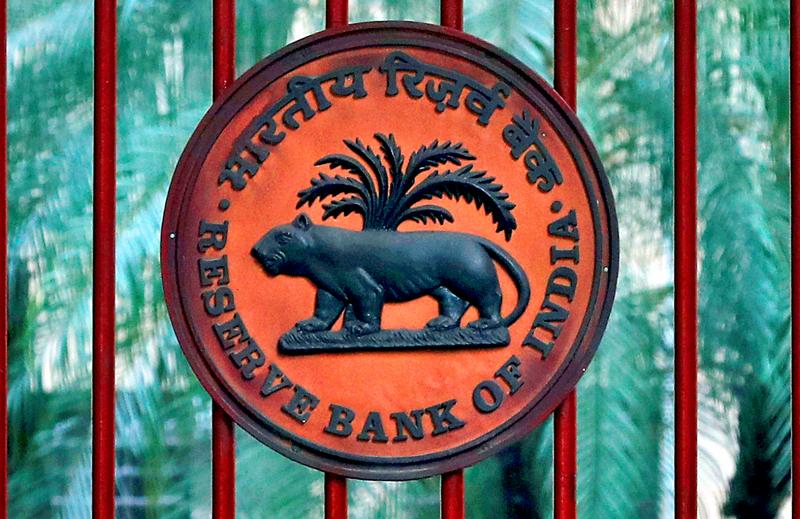India yesterday expanded its version of quantitative easing to keep borrowing costs anchored as economic growth is expected to falter due to a surge in COVID-19 infections.
The central bank is to buy an additional 1.2 trillion rupees (US$16.4 billion) of bonds next quarter under the so-called Government Securities Acquisition Program 2.0, Reserve Bank of India (RBI) Governor Shaktikanta Das said.
The program is aimed at keeping interest rates low at a time when the Indian government plans a near-record borrowing to aid the economy’s recovery.

Photo: Reuters
The bank lowered its expectation for GDP growth to 9.5 percent in the current fiscal year, down from 10.5 percent previously.
The Monetary Policy Committee kept the benchmark repurchase rate steady at 4 percent, as expected by all 44 economists surveyed by Bloomberg.
The six-member committee, which has been in pause mode for more than a year, said that it was retaining its accommodative policy for as long as necessary to revive and sustain growth on a durable basis, implying that there is still room to cut rates further.
“At this juncture, policy support from all sides is required to gain the momentum of growth,” Das said.
“The RBI is throwing its weight behind the fiscal effort to spur a recovery, motivated by a view that it can’t take interest rates any lower,” Bloomberg economist Abhishek Gupta said.
The bond-buying program aims to support the administration’s borrowing plan, with the central bank buying sovereign debt to cap yields, despite stubborn inflationary expectations.
It is already on course to acquire 1 trillion rupees of bonds in the quarter ending this month, in addition to using steps such as a US Federal Reserve-style “Operation Twist” and targeted longer-term refinancing operations to maintain ample liquidity.
Sovereign bonds fell, with the yield on benchmark 10-year bond rising by 1 basis point to 6.01 percent, while the rupee and stocks were slightly lower.
“Monetary policy hand-eye coordination is getting increasingly complicated,” Nomura Holdings Inc economist Aurodeep Nandi said.
“The timing of the RBI’s ‘policy pivot’ toward normalization will remain crucially contingent” on the COVID-19 vaccination pace, he said.
A recovery in the third-largest economy in Asia is in peril amid the outbreak, which prompted several states to impose lockdowns.
The movement and activity curbs are expected to fan inflation and hit GDP, with many economists already cutting their growth forecasts for this fiscal year to single digits, from double digits previously.
In addition to cutting its growth forecast, the rate panel now sees inflation ending at 5.1 percent for the year, toward the upper end of its 2 to 6 percent target.
The rate decision comes amid concerns that higher input and wholesale costs could feed into consumer prices. The build-up in price pressures is partly due to supply disruptions caused by the pandemic and higher global commodity prices.
Das also announced a number of measures, including on tap liquidity, under which banks can borrow as much as 150 billion rupees to lend to COVID-19-affected sectors such as hotels and the tourism industry.
Das doubled the amount of debt that banks can restructure for a small borrower to 500 million rupees, to include more distressed businesses.
The move comes on the back of its second set of debt-resolution steps announced last month.

Taiwan Transport and Storage Corp (TTS, 台灣通運倉儲) yesterday unveiled its first electric tractor unit — manufactured by Volvo Trucks — in a ceremony in Taipei, and said the unit would soon be used to transport cement produced by Taiwan Cement Corp (TCC, 台灣水泥). Both TTS and TCC belong to TCC International Holdings Ltd (台泥國際集團). With the electric tractor unit, the Taipei-based cement firm would become the first in Taiwan to use electric vehicles to transport construction materials. TTS chairman Koo Kung-yi (辜公怡), Volvo Trucks vice president of sales and marketing Johan Selven, TCC president Roman Cheng (程耀輝) and Taikoo Motors Group

Among the rows of vibrators, rubber torsos and leather harnesses at a Chinese sex toys exhibition in Shanghai this weekend, the beginnings of an artificial intelligence (AI)-driven shift in the industry quietly pulsed. China manufactures about 70 percent of the world’s sex toys, most of it the “hardware” on display at the fair — whether that be technicolor tentacled dildos or hyper-realistic personalized silicone dolls. Yet smart toys have been rising in popularity for some time. Many major European and US brands already offer tech-enhanced products that can enable long-distance love, monitor well-being and even bring people one step closer to

RECORD-BREAKING: TSMC’s net profit last quarter beat market expectations by expanding 8.9% and it was the best first-quarter profit in the chipmaker’s history Taiwan Semiconductor Manufacturing Co (TSMC, 台積電), which counts Nvidia Corp as a key customer, yesterday said that artificial intelligence (AI) server chip revenue is set to more than double this year from last year amid rising demand. The chipmaker expects the growth momentum to continue in the next five years with an annual compound growth rate of 50 percent, TSMC chief executive officer C.C. Wei (魏哲家) told investors yesterday. By 2028, AI chips’ contribution to revenue would climb to about 20 percent from a percentage in the low teens, Wei said. “Almost all the AI innovators are working with TSMC to address the

FUTURE PLANS: Although the electric vehicle market is getting more competitive, Hon Hai would stick to its goal of seizing a 5 percent share globally, Young Liu said Hon Hai Precision Industry Co (鴻海精密), a major iPhone assembler and supplier of artificial intelligence (AI) servers powered by Nvidia Corp’s chips, yesterday said it has introduced a rotating chief executive structure as part of the company’s efforts to cultivate future leaders and to enhance corporate governance. The 50-year-old contract electronics maker reported sizable revenue of NT$6.16 trillion (US$189.67 billion) last year. Hon Hai, also known as Foxconn Technology Group (富士康科技集團), has been under the control of one man almost since its inception. A rotating CEO system is a rarity among Taiwanese businesses. Hon Hai has given leaders of the company’s six